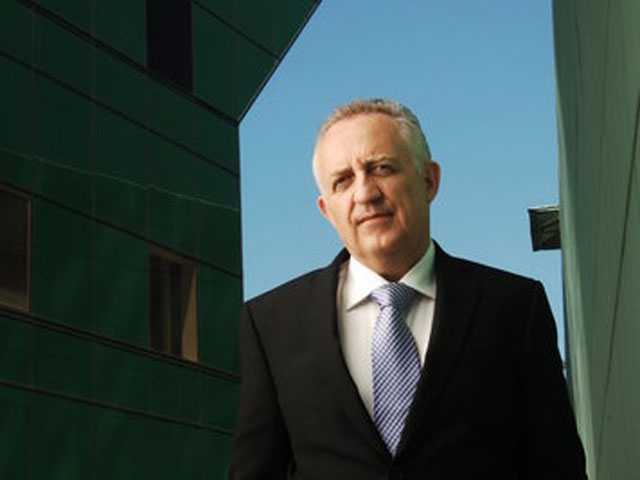
Impact Man: Bramwell Tovey
All images used with kind permission of Bramwell Tovey
Many musicians with a background in brass bands have gone on to forge careers as players in the orchestral world but none has perhaps made such an impact as Bramwell Tovey, who now conducts many of the greatest orchestras on the musical planet.
The current Chief Conductor of the Vancouver Symphony Orchestra might regularly traverse the globe, yet his continued involvement in the brass band world through his work with the National Youth Brass Band of Great Britain and Foden’s, coupled with his tireless moral support for banding in general has never been more crucial.
4BR’s Chris Thomas caught up with him to talk about all things musical….
Chris Thomas: You come from a Salvationist background and your father was a euphonium player with both Ilford Citadel Band and the ISB.
Looking back, what do you feel were your formative early musical experiences and influences?
Bramwell Tovey: Every aspect of family life was centered around the Salvation Army.
There were three services on a Sunday plus Sunday school and three ‘open-airs’ with lots of charging about. During the week there were practices for the band, songsters, singing company and junior band and at one point I was involved in all of them.
Saturday nights would have the most interesting music.
For the band this meant Festival series publications, often plus a piano, brass or vocal soloist and on Sundays, devotional music of a very high order, especially under Songster Leader Keith Prynn at Ilford Corps who was a brilliant and dynamic musician.
My first bandleader was Pat Paisey whom I met again a few weeks ago for the first time in over 40 years. He was marvellous.
My sisters, Jane and Elisabeth and my mother Joan, were in the singing company or the songsters and my father, Bernard, was in the band as you mentioned. My grandparents on both sides were retired SA soldiers.
Away from the SA, I first heard an orchestra at Ilford County High School aged 11.
Robert Ferguson performed the 'Grieg Piano Concerto'. The experience gained in the Redbridge Youth Orchestra and in all kinds of choirs was invaluable, whether singing or accompanying.
However, apart from Tylney Hall ‘A’ band (SA summer music camp) under Norman Bearcroft and a few weeks in the City of London Band with Geoffrey Brand, I never played in a top class brass band.
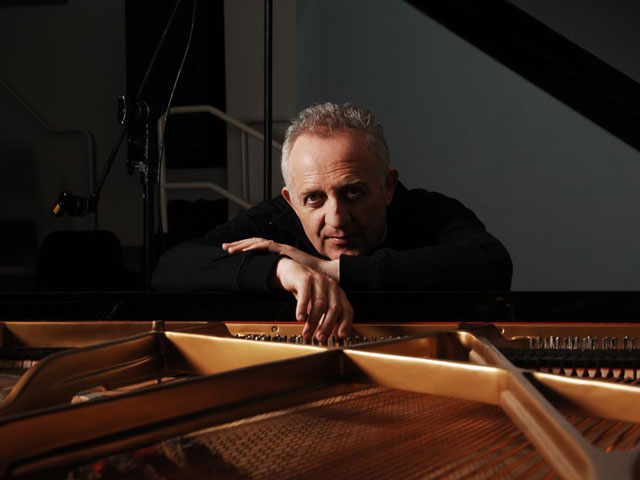
Looking back...
Chris Thomas: Does the Salvation Army still hold a special place in your heart, both musically and spiritually?
Bramwell Tovey: Inevitably.
Paul Hindmarsh and Eddie Gregson rib me about my affection for SA music, but that can’t be helped. I never wore the modern uniform, only the traditional tunic.
I was a uniformed Salvationist until the age of 19. In 2011 when my mother was buried, her SA bonnet was placed on the coffin.
Those traditions die-hard. I’ve never been one of those ex-Salvationists who are keen to trash the organization.
The SA did a great deal for me.
I understand perfectly well how the SA emerged in 19th century England, captivating my great-grandparents on both sides. Its energy and evangelical nature has inspired my family for well over 150 years.
You asked if the SA holds a place spiritually too. Well, yes it does, although I am very independently minded.
Fortunately, I’m very healthy but if I were ever to go into hospital I’d probably give my religion as Salvationist.
In confronting mortality I’d rather converse with an SA officer than any other kind of clergy. Besides, we could also chat about bands.
Chris Thomas: It was inevitable that you would take up a brass instrument, which turned out to be the tuba.
As a young player you had lessons from the great John Fletcher. What are your recollections?
Bramwell Tovey: In fact I started on baritone, only graduating to Eb tuba aged 14.
I didn’t meet John Fletcher until the RAM but his impact on my musical life has been overwhelming.
Fletch, the musician, was a very great man. I was lucky to study with him when he was absolutely at the top of his game. He was an extraordinarily natural musician but was able to clearly articulate how he approached music.
John’s concepts of note shapes are ideas that I refer to every day of my conducting life.
They were simple and brilliant. Every student that’s been through my hands at the NYBBGB has benefitted from John’s teaching.
I played second tuba to him in the LSO a number of times, particularly in 1975 when the orchestra went to the Salzburg Festival with James Levine and Leonard Bernstein.
Howard Snell was playing principal trumpet at that time and was also chairman of the LSO. I was too in awe of Howard to speak to him. Although we are acquainted, I hardly know him even today, though I admire him enormously.
Frank Matheson, the LSO’s legendary bass trombonist, now retired and living in Yorkshire, was incredibly supportive of me, both as a tuba player and later as a conductor.
Tragically, John died when he was only 44.
I happened to be conducting his last engagement with the LSO, at CTS Wembley. We were recording ‘The Sleeping Beauty’ for a Robin Cousins Christmas special on ice.
We had lunch together the day before he collapsed. He looked awful that day.
Visiting him in hospital, when he was in a vegetative state, was very distressing. His funeral at Golders Green Crematorium was packed to the rafters with friends, colleagues, students and family.
I have no doubt that he was the greatest brass player in the UK in the early 1970s and one of the top dozen finest brass players I’ve ever heard. Cellists sought out his performances of unaccompanied Bach suites.
Genuinely self-effacing, his Leeds accent combined with his Cambridge educated brain (although he protested that he only managed a ‘third’) made him one of the most entertaining characters in the business.
Chris Thomas: The piano was your main instrument at this time however?
Bramwell Tovey: Well, it was supposed to be, but I ended up principal study on piano and tuba, as well being on the conducting course.
I had neither the ambition nor the ability to be a concert pianist but I did intend to play the piano as an accompanist and repetiteur.
What’s surprised me is how much I’ve played solo.
Playing ‘Rhapsody in Blue’ with the New York Philharmonic a few years ago, I remember thinking, “How on earth did this come about?”
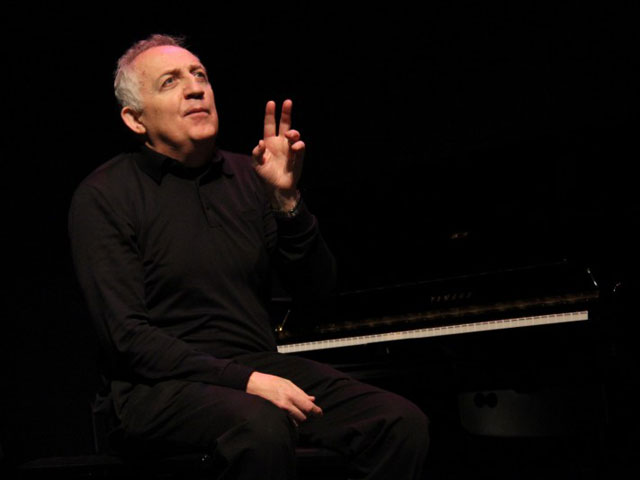
Now a fellow...
Chris Thomas: And you were also composing during your student years?
Bramwell Tovey: Yes, but a dreadful experience as a young lad in the YP Band at Ilford some time after Pat Paisey had moved away rather put the brakes on that.
I’d written a march called ‘Providence’. I was about 13 and had asked the new bandleader if we could run it through.
I wrote out the parts and of course, they just weren’t used to sight-reading from manuscript, especially when it was not very neatly written.
It was an utter disaster, which was completely devastating for me. Being extremely shy, what little self-confidence I had was destroyed in a few moments.
After that I made arrangements and composed for piano, voice and small combinations but wrote no more brass band music until ‘Coventry Variations’ about 20 years later.
I got a B.Mus at King’s, London and everything else at the RAM.
Apart from John Fletcher and two other teachers, Arthur Jacobs and Noel Cox, I hated being a student at the RAM.
I had always imagined I’d go and do some post-graduate study somewhere, but life intervened.
A short while ago I was elected a Fellow of the RAM and although I couldn’t make the ceremony, I was invited in for tea to meet some of the staff.
There’s a much better atmosphere now than in my day.
Chris Thomas: During your period of study at the Royal Academy you spent several years conducting the Hanwell Band.
How significant was this along with your work with brass bands generally in fine-tuning your technique as a young conductor?
Bramwell Tovey: This turned out to be incredibly important.
At Hanwell there was the chance to experiment as a conductor and develop a rehearsal technique.
We made several broadcasts for BBC Radios 2 & 3, which got noticed, and this in turn helped my career over the next few years.
Hanwell also gave me the chance to mature a little, which every 19-year-old needs.
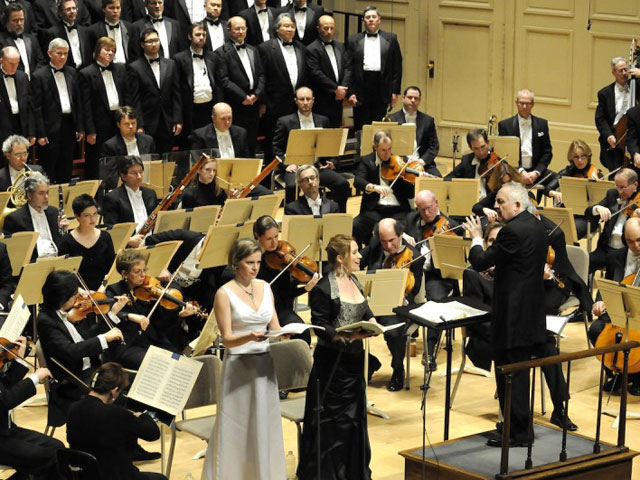
Keeping an eye on things...
Chris Thomas: What do you consider to have been your first big break as a conductor?
Bramwell Tovey: At the end of 1975, London Festival Ballet (now the English National Ballet) advertised for an assistant rehearsal pianist and conductor.
I had played tuba with LFB as a deputy for Victor Saywell, who was very kind to me in my playing days.
For the audition, I turned up in Birmingham and conducted a midweek matinée of the ‘Prologue’ and ‘Act 1’ of Tchaikovsky’s ‘Sleeping Beauty’.
Three weeks went by during which, with my usual lack of confidence, I thought I’d been ruled out.
But their Principal Conductor, Graham Bond, must have seen something and called to offer me the position.
I was 22 years old and pitched into a 12 hour a day, 6 day a week job, virtually living out of a suitcase.
I remember vividly the ‘sink or swim’ moment and surviving it.
I had the opportunity to work with the great Massine himself on ‘Parade’ and the ‘Three Cornered Hat,’ which he had premiered with the Diaghilev Ballet Russe and I was one of the music staff who played rehearsals and conducted performances with Rudolf Nureyev.
His productions of ‘Romeo and Juliet’ and ‘The Sleeping Beauty’ were premiered by the company.
By the summer of 1976 I decided to give up the tuba entirely and sold it to Patrick Harrild.
I paid off a few debts and invested the rest in scores.
Chris Thomas: In 1986 you conducted the opening night of the London Symphony Orchestra’s Leonard Bernstein Festival in the presence of Bernstein himself.
Could you tell us a little about the circumstances surrounding that night and your experiences of working with Bernstein?
Bramwell Tovey: The phone rang around 2.00am on a Monday morning.
It was Clive Gillison, then Managing Director of the LSO.
Conductor/composer Lukas Foss had food poisoning and had cancelled his appearance at the opening night of the orchestra’s Leonard Bernstein Festival at the Barbican Centre. Would I stand in?
Rehearsals started that morning and the concert was the following day.
“Oh, one more thing; Bernstein will be around but doesn’t want to conduct.”
Life was never the same after that.
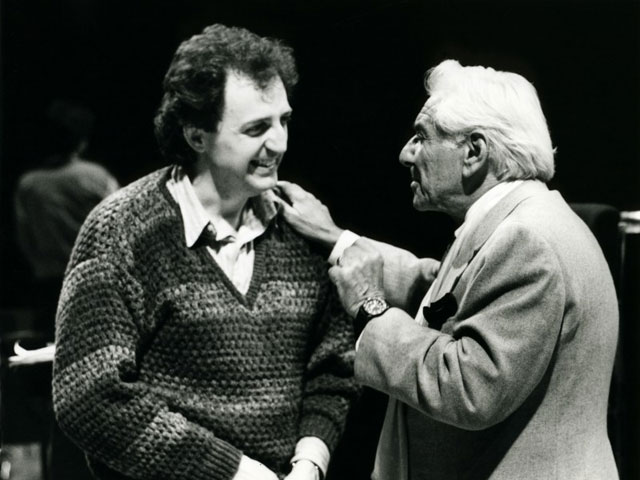
Mr Bernstein I presume....
Recently, an old Channel 4 interview with Bernstein showed up in which he talked about this occasion.
At his invitation, I went to Tanglewood as a visiting artist, the summer home of the Boston Symphony, to observe his and Seiji Ozawa’s rehearsals.
As a direct result of these experiences I conducted most of the major UK orchestras over the next few years and started to travel abroad more.
Bernstein was extraordinary.
Although much reviled by the avant-garde at the time, many of his ideas and theories as well as his works, have survived the test of time.
He was a very interesting conductor to watch, though not everything sounded great.
I loathed his ‘Enigma Variations’ with the BBC Symphony. Clearly, the divide between the biggest maestro in the USA and the UK’s main broadcasting orchestra, was too great to bridge.
His interpretation of ‘Nimrod’ was awful, pure self-indulgence.
In the original TV broadcast of the rehearsals there is a moment of tension between Lenny and Jim Gourlay on tuba, which is worth revisiting.
However, a ‘Mahler 2’ that he did at Edinburgh and recorded in Ely Cathedral, was electrifying. I was lucky enough to attend the recording sessions. The LSO knew how to turn him on.
There was a disturbance at the back of the Barbican as Bernstein entered with his entourage.
He came straight to the podium, shook my hand and gave me a big hug. He made every effort to make this one of the most memorable days of my life.
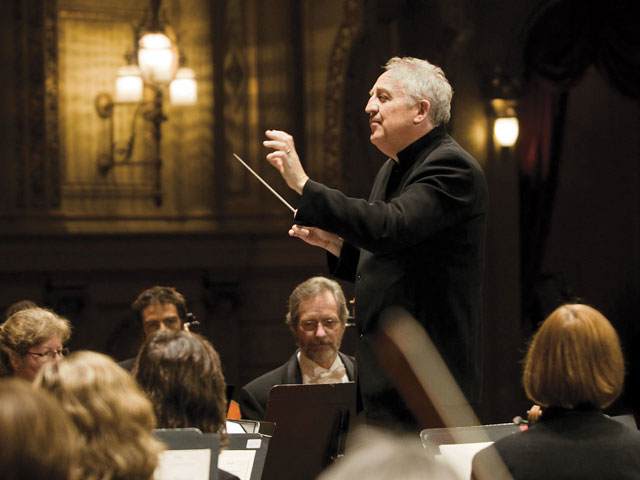
At the helm...
Coincidentally, during that week I was also conducting the premiere of my own score, ‘The Snow Queen’ with Sadler’s Wells Royal Ballet in Birmingham.
After Monday rehearsals I caught the train to Birmingham for the premiere and had supper afterwards with the company’s patron, Princess Margaret.
On Tuesday after the concert I attended a reception with Leonard Bernstein at the Barbican, but on Wednesday it was fish and chips in the car.
On the Friday I remember conducting both GUS and the BBC Concert Orchestra on ‘Friday Night Is Music Night’ in a live broadcast.
A heady few days.
I’ve spent a long time talking about Bernstein with musicians in the New York Philharmonic who played for him.
Without exception they describe him as a genius, particularly in his ability to perform complex orchestral repertoire on the piano.
Chris Thomas: I once recall once Esa-Pekka Salonen saying that he considered himself first and foremost a composer and a conductor second, whereas many people tend to think of him the opposite way around.
As a conductor, composer and pianist you are very much an all round musician but do you consider yourself a conductor first and foremost?
Bramwell Tovey: So far as I consider it at all, I’m probably a conductor first, except when I’m not. I’m lucky to be able to enjoy all these things.
Basically, I’m just a musician.
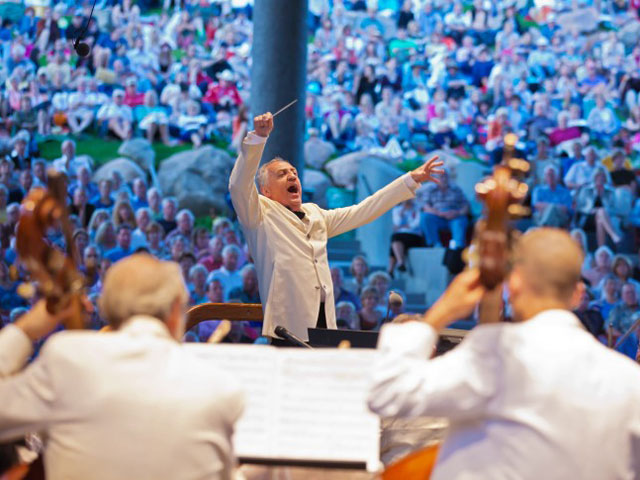
Rhapsody in blue...
Chris Thomas: But throughout your conducting career, composing and playing the piano have always co-existed alongside your professional conducting work?
Bramwell Tovey: More or less, but I didn’t think playing the piano would be anything like as important as it has turned out.
Max Tapper, the manager in Winnipeg when I came to North America, heard me play at a party and suggested it would be a great thing if I played a concerto during my inaugural season.
I wasn’t at all sure he was right but decided to play and conduct Gershwin’s ‘Rhapsody in Blue’.
I’d seen Previn and Bernstein do this and thought it might be fun. I’ve lost count of how many times I’ve done it now - and with all kinds of orchestras, from the New York Philharmonic, the RSNO, to the Sydney Symphony at the Sydney Opera House.
I’ve even done it with Stanley Drucker, the great New York Philharmonic clarinetist who played the opening glissando solo, which he also did for Ferde Grofé, who in turn, conducted and orchestrated the piece for Gershwin himself.
As for composing, when ‘Requiem for a Charred Skull’ won the 2003 Juno Award I was inundated with requests for pieces, including the trumpet concerto ‘Songs of the Paradise Saloon’ for the Toronto Symphony, ‘Fugitive Voices’ for the Sweetwater Festival and of course, the opera ‘The Inventor’, commissioned by Calgary Opera.
By using the term “alongside” you make it sound ridiculously leisurely.
In fact, almost everything I’ve written has been set down between performances as a conductor, losing hours of sleep and feeling utterly overstretched and useless.













